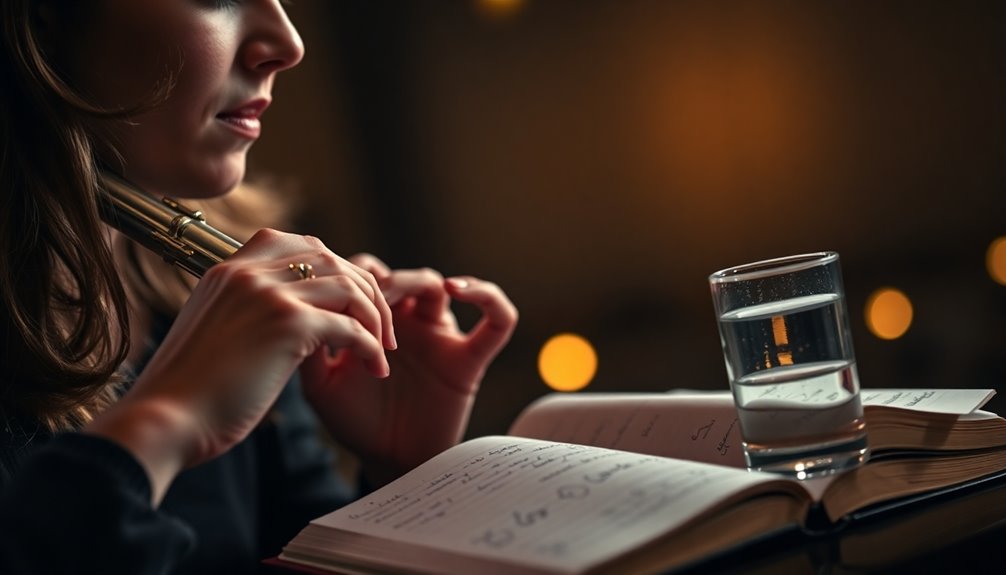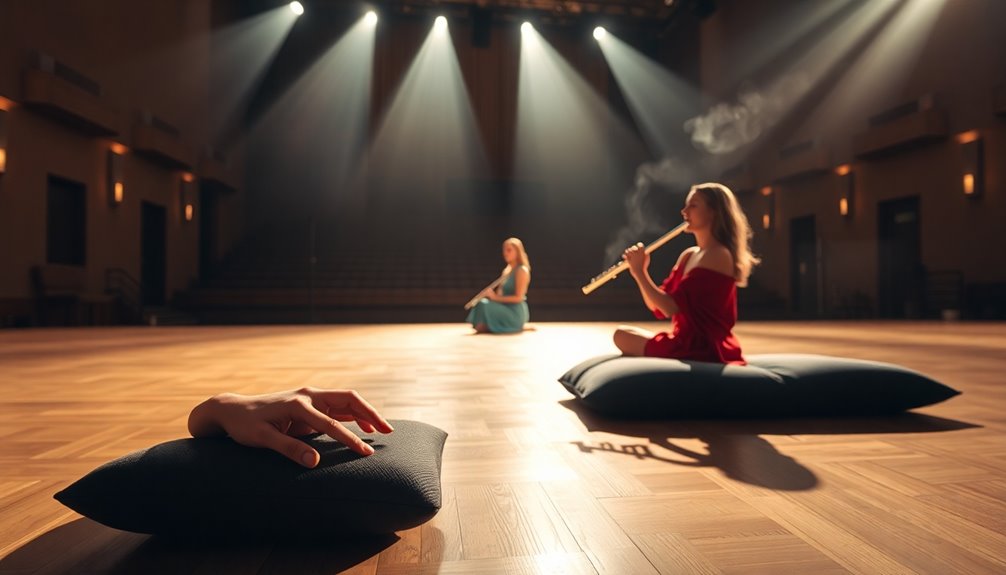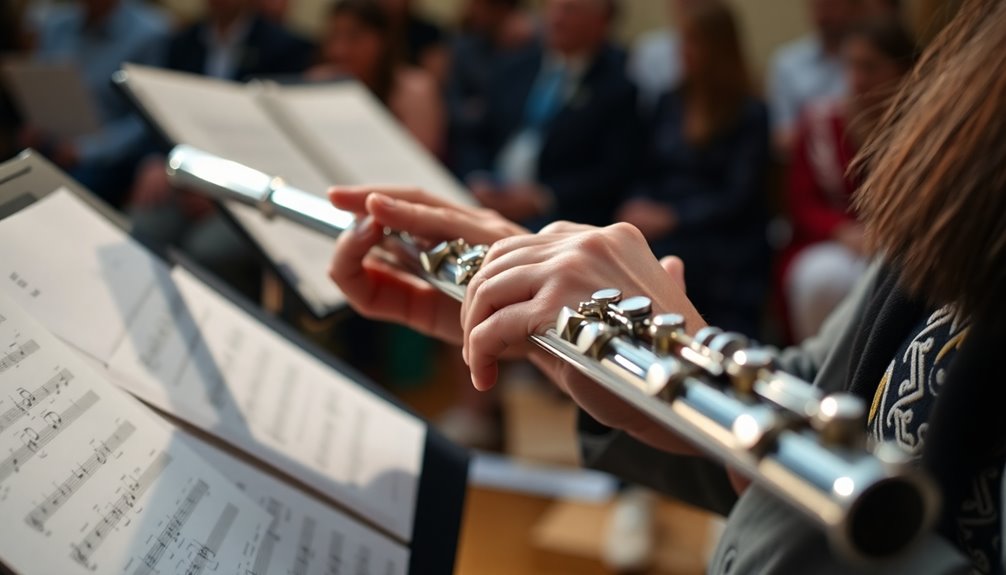Flute performance anxiety is something many musicians face, but you can definitely overcome it with the right strategies. Start by practicing consistently to build familiarity and confidence. Engaging in warm-up routines and breathing exercises can ease your nerves before you play. Visualization techniques, like imagining a successful performance, help create a calm mindset. Remember to celebrate small wins along the way; each focused practice session prepares you for the stage. Surrounding yourself with a supportive community can also make a world of difference. There are more insights and techniques that can help you feel ready for your next performance.
Key Takeaways
- Engage in consistent practice to build familiarity and confidence with the flute, reducing performance anxiety.
- Implement breathing exercises before playing to calm your mind and body.
- Visualize successful performances to cultivate a positive mindset and enhance confidence.
- Create a supportive environment with mock performances to simulate real situations.
- Utilize gratitude practices to shift your focus from fear to positivity and empowerment.
Understanding Performance Anxiety

Performance anxiety can feel like a heavy weight pressing down on your chest when you step onto the stage. You're not alone in experiencing this; many performers share your struggle.
Understanding the causes of performance anxiety is the first step toward overcoming it. Often, it stems from a fear of judgment or making mistakes in front of others. The pressure to meet your own expectations or those of your peers can intensify these feelings.
You might notice symptoms of anxiety manifesting as a racing heart, shaky hands, or a tight throat. These physical responses can create a feedback loop, making you feel even more anxious as you perform.
It's important to recognize that these feelings are common and part of being human. Embracing this reality can help you feel more connected to others who face the same challenges. Seeking professional help can provide valuable tools for managing stage fright and building confidence.
Creating a supportive environment around yourself can make a world of difference. Talk to fellow musicians about their experiences, and remember, vulnerability can foster connection.
Ultimately, understanding that performance anxiety is a shared experience can help you feel less isolated, making your journey as a flutist more enjoyable and fulfilling.
Preparation Techniques

- Consistent practice: Regularly dedicate time to your flute to build familiarity and skill.
- Warm-up routines: Start each session with scales and arpeggios to get your fingers moving and your body ready.
- Breathing exercises: Incorporate deep breathing techniques to help calm your mind and body before playing.
- Mock performances: Practice in front of friends or family to simulate the performance atmosphere.
- Goal setting: Set achievable goals for each practice session, focusing on specific pieces or techniques.
- Establishing a consistent practice schedule not only helps in building confidence but also enhances skill retention over time.
Mindfulness and Relaxation

Amidst the swirl of anticipation and nerves, practicing mindfulness and relaxation techniques can transform your pre-performance experience. By incorporating breathing exercises and meditation techniques into your routine, you can cultivate a sense of calm that allows your musical expression to shine.
Here's a simple guide to help you navigate these practices:
| Technique | Description | Benefits |
|---|---|---|
| Breathing Exercises | Focus on deep, slow breaths. | Reduces stress and increases focus. |
| Mindful Listening | Listen to calming music. | Enhances relaxation and presence. |
| Body Scan Meditation | Focus on each body part. | Releases tension and promotes awareness. |
| Visualization | Imagine a successful performance. | Builds confidence and reduces anxiety. |
| Gratitude Practice | Reflect on what you're thankful for. | Shifts mindset and fosters positivity. |
Integrating these techniques into your practice can help you feel more grounded and connected. Remember, it's okay to feel nervous; you're not alone in this journey. Embrace these moments and allow yourself to thrive through mindfulness and relaxation. You're part of a supportive community, and together, we can overcome performance anxiety. Additionally, incorporating breath control exercises can further enhance your performance by improving your lung capacity and sound quality.
Visualization Strategies

Visualization strategies can be a powerful tool in your journey to overcome performance anxiety. By harnessing mental imagery and success visualization, you can create a mental environment that promotes calmness and confidence before you step on stage.
Consider these practical tips to enhance your visualization practice:
- Imagine the Performance: Picture yourself on stage, feeling calm and collected as you play your flute.
- Focus on Success: Visualize each note flowing beautifully, connecting with your audience and feeling their support.
- Create a Safe Space: Envision a supportive environment, where mistakes are seen as learning opportunities rather than failures.
- Use All Senses: Engage all your senses in your mental imagery—hear the music, feel your breath, and see the stage.
- Practice Regularly: Make visualization a part of your daily routine, just like your physical practice.
- Incorporate Mindfulness Techniques: Integrating mindfulness practices can further enhance your visualization, promoting relaxation and focus during performances.
Building Confidence Through Practice

Building confidence in your flute performance often stems from consistent practice. When you establish clear practice routines, you're not just honing your skills; you're also creating a solid foundation of familiarity and comfort with your instrument. This familiarity can help reduce anxiety, as you'll feel more prepared for any performance situation.
Incorporate positive affirmations into your practice. Remind yourself of your progress and strengths, whether it's nailing that tricky passage or simply enjoying the sound you produce. Saying things like, "I am a skilled flutist" or "I embrace challenges" can shift your mindset from self-doubt to self-empowerment.
Consistency is key. Even short, focused practice sessions can make a big difference over time. As you see improvements, you'll start to trust yourself more, and that confidence will carry over into performances. Additionally, utilizing structured lessons can provide guidance and a clear pathway for skill development.
Frequently Asked Questions
Can Performance Anxiety Affect My Physical Health?
Yes, performance anxiety can definitely affect your physical health.
When you experience anxiety, your body triggers a stress response, leading to physical symptoms like increased heart rate, sweating, or even muscle tension.
It's important to recognize these signs and understand that you're not alone; many others feel this way too.
Finding ways to manage your anxiety can help you feel more at ease, allowing you to perform without those overwhelming physical sensations.
You've got this!
How Do I Know if I Have Performance Anxiety?
You might feel a mix of excitement and dread before a performance.
Identifying symptoms is key; do you experience rapid heartbeat, shaking, or an overwhelming sense of fear?
Emotional triggers like past experiences or high expectations can amplify these feelings.
If you notice these signs consistently, it's a good indication you're facing performance anxiety.
Is Performance Anxiety Common Among Professional Musicians?
Yes, performance anxiety is quite common among professional musicians.
You're not alone in feeling those nerves before a performance. Many musicians experience similar fears, and it's completely natural. Recognizing this can help you feel more connected to your peers.
By sharing your experiences and seeking support, you can start overcoming those fears. Remember, it's about progress, not perfection, and every musician faces challenges on their journey.
You're part of a supportive community.
Can Medication Help With Performance Anxiety?
Medication can help with performance anxiety, but it's important to weigh the types and potential side effects.
Some people find relief with anti-anxiety meds or beta-blockers, which can reduce physical symptoms like trembling. However, everyone reacts differently, so it's vital to consult a healthcare professional.
You're not alone in this journey, and finding the right solution can take time.
What Role Does Nutrition Play in Managing Anxiety?
Nutrition plays a vital role in managing anxiety, and you've got the power to make choices that support your well-being.
While fast food might seem comforting, calming foods like leafy greens and whole grains can nourish your mind.
Employing nutrition strategies like mindful eating and staying hydrated helps create a sense of balance.
Conclusion
You're not alone in facing performance anxiety; studies show that around 40% of musicians experience it at some point. Remember, it's okay to feel nervous—what matters is how you manage those feelings. By incorporating preparation techniques, mindfulness, and visualization into your routine, you can transform anxiety into a source of energy and focus. Each practice session builds your confidence, helping you shine when it counts. Embrace the journey, and let your passion for music guide you.






